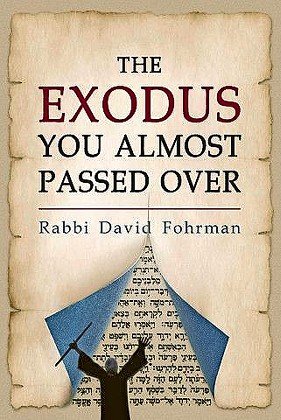Here’s the Exodus that you almost passed over
In English references, names of our Jewish holidays are almost always listed and used in the Hebrew terms, even those that have English equivalents. That is all holidays, except one, Pesach, which more often than not is listed as Passover.
In he book, “The Exodus You Almost Passed Over,” Rabbi David Fohrman presents an amusing play on the holiday’s name and theme.
This week’s essay will reference the author’s humorous take on a holiday’s name and quote the book’s introduction take to give you a taste of his talented pen:
“In Hebrew, it is Pesach; in English, it is Passover. But, either way, it seems like an odd name for a holiday. Would you have named it that?
“Imagine it is 3,000 years ago. You are an angel in heaven, and you have been invited to join G-d’s Nominating Committee for the Naming of New Festivals. One day you and your fellow angels on the committee get word that the Master of the Universe would like to make a shiny new festival that celebrates His miraculous deliverance of the Israelites from slavery in Egypt. You immediately get down to work with your colleagues to brainstorm some possible names.”
Among the names mentioned are Freedom Day, and Independence Day. Nothing unusual there, but here is the catch.
“Imagine some angel in the back of the room raises his hand and says, ‘I have a great idea. Much better than those names. Let us call it Passover. Passover is a really wonderful name’.”
Rabbi Fohrman continues with this gag narrative:
“See, it is a kind of a pun. … You know how G-d made all these plagues to let the Israelites go, and then there was this tenth plague, right? And in the tenth plague, all the firstborn children of the Egyptians were killed. But the Israelites? They were saved. So you could say that G-d sort of ‘passed over’ their first-born children that night, when he didn’t kill them. You get it? He passed over their first-born? So let us call it Passover!”
A bit of give and take ensues but finally the name Passover wins. With this all as prologue, the author adds the following observation:
“Perhaps the name suggests that we should adjust our sights somewhat. We tend to think of Passover the way I have just described it to you, as a holiday on which we got our freedom. And yet, the Torah’s own name for the night we went free does not emphasize the ‘free’ part, it emphasizes ‘passed over.’ Could it be that, somehow, the essence of the holiday really does revolve around the mysterious salvation that our firstborn experienced that night?”
I bet that you, my dear reader, never thought of the Passover name in this perspective. Neither did I, until now.
Further on in this work, we come across the following:
“Passover looks at the events of the Exodus as significant not in terms of history but in terms of destiny.”
As I look at this statement, as a student of both history and religion, I see Rabbi Fohrman reflecting in these words the signposts of what Passover is all about, and why it is so special a holiday that even an English nomenclature sounds respectable for use in the most spiritual contexts.
Read his preface very carefully, for within it you will glean the author’s intent and find the basis of his deep and sincere belief in our faith and its observances.









